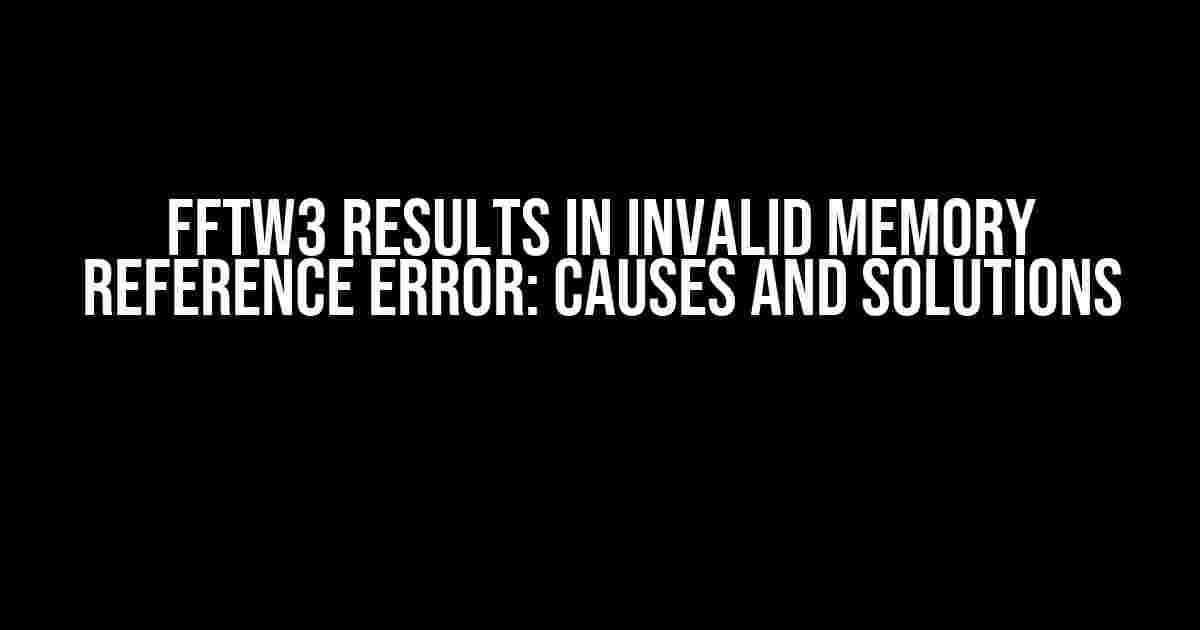If you’re reading this, chances are you’ve encountered the frustrating “invalid memory reference” error while using the FFTW3 library. Don’t worry, you’re not alone! This error can be a real showstopper, but fear not, dear reader, for we’re about to dive into the world of FFTW3 troubleshooting and emerge victorious on the other side.
The FFTW3 Library: A Brief Introduction
Before we dive into the error itself, let’s take a quick look at what FFTW3 is and why it’s so important. The Fastest Fourier Transform in the West (FFTW) is a legendary C subroutine library for computing the discrete Fourier transform (DFT) and its inverse. It’s the go-to tool for scientists, engineers, and developers working with signal processing, image analysis, and more.
What Causes the Invalid Memory Reference Error?
So, what’s behind this pesky error? There are several reasons why FFTW3 might throw up its hands and cry “invalid memory reference!” Here are the top culprits:
- Memory Allocation Issues: When you allocate memory for your FFTW3 plans, you need to make sure you’re doing it correctly. If you’re using malloc() or new[], ensure you’re allocating enough space for the complex numbers (or real numbers, depending on your usage).
- Plan Creation Failure: FFTW3 plans are created using the fftw_plan_dft() or fftw_plan_r2r() functions. If these functions fail, you’ll end up with an invalid plan, which will cause the memory reference error.
- Incorrect Array Sizes: When you create your arrays for the FFTW3 input and output, make sure they’re the correct size. If your arrays are too small, you’ll get the error.
- Data Type Mismatch: FFTW3 is very particular about data types. If you’re using the wrong data type for your input or output, it’ll result in the error.
- Library Configuration Issues: FFTW3 has various configuration options that can affect its behavior. If these options are not set correctly, you might encounter the error.
Troubleshooting Steps
Now that we’ve identified the potential causes, let’s go through some troubleshooting steps to fix the issue:
- Check Your Memory Allocation:
fftw_complex *in, *out; in = (fftw_complex*) fftw_malloc(sizeof(fftw_complex) * N); out = (fftw_complex*) fftw_malloc(sizeof(fftw_complex) * N);Make sure you’re using the correct memory allocation functions and sizes.
- Verify Plan Creation:
fftw_plan p; p = fftw_plan_dft(1, &N, in, out, FFTW_FORWARD, FFTW_ESTIMATE);Check the return value of the plan creation function to ensure it’s not NULL.
- Double-Check Array Sizes: Verify that your input and output arrays are the correct size, using the correct data type (e.g., fftw_complex for complex numbers).
- Confirm Data Type Consistency: Ensure that your input and output data types match the FFTW3 function requirements.
- Review Library Configuration: Check your FFTW3 configuration options, such as the planner flags (e.g., FFTW_ESTIMATE, FFTW_MEASURE), to ensure they’re set correctly.
Example Code: A Working FFTW3 Example
Here’s an example code snippet that demonstrates a working FFTW3 implementation:
#include <fftw3.h>
int main() {
int N = 1024;
fftw_complex *in, *out;
fftw_plan p;
in = (fftw_complex*) fftw_malloc(sizeof(fftw_complex) * N);
out = (fftw_complex*) fftw_malloc(sizeof(fftw_complex) * N);
// Initialize input data
for (int i = 0; i < N; i++) {
in[i][0] = i; // Real part
in[i][1] = i; // Imaginary part
}
// Create FFTW3 plan
p = fftw_plan_dft(1, &N, in, out, FFTW_FORWARD, FFTW_ESTIMATE);
// Execute FFT
fftw_execute(p);
// Clean up
fftw_destroy_plan(p);
fftw_free(in);
fftw_free(out);
return 0;
}FFTW3 Best Practices
To avoid the invalid memory reference error and ensure a smooth FFTW3 experience, follow these best practices:
| Best Practice | Description |
|---|---|
| Use fftw_malloc() and fftw_free() | Use the FFTW3-provided memory allocation functions to ensure correct memory management. |
| Check plan creation return values | |
| Use correct data types and array sizes | Ensure that your input and output arrays use the correct data type (e.g., fftw_complex) and size. |
| Configure FFTW3 correctly | Review and set planner flags (e.g., FFTW_ESTIMATE, FFTW_MEASURE) according to your specific use case. |
Conclusion
The FFTW3 “invalid memory reference” error can be a frustrating roadblock, but by following the troubleshooting steps and best practices outlined in this article, you’ll be well on your way to resolving the issue and getting back to your signal processing tasks. Remember to allocate memory correctly, verify plan creation, and double-check array sizes and data types. With FFTW3, the world of fast Fourier transforms is at your fingertips – go forth and transform!
If you have any further questions or need additional guidance, feel free to ask in the comments below!
Frequently Asked Question
Are you stuck with the FFTW3 results invalid memory reference error? Worry not! We’ve got you covered with some FAQs that’ll help you troubleshoot and fix the issue in no time.
Q1: What causes the FFTW3 results invalid memory reference error?
This error usually occurs when there’s a mismatch between the size of the input array and the size of the FFTW plan. Make sure to double-check the size of your input array and the plan configuration to ensure they match.
Q2: How do I check for memory alignment issues?
To check for memory alignment issues, you can use the `fftw_ align_of` function to ensure that your input array is aligned to the correct boundary. You can also use tools like Valgrind or AddressSanitizer to detect any memory access issues.
Q3: Can I use FFTW3 with 32-bit applications?
While FFTW3 does support 32-bit applications, it’s essential to note that the library may not work correctly or efficiently with large datasets. If you’re working with large datasets, it’s recommended to use a 64-bit application to avoid memory limitations.
Q4: How do I optimize my FFTW3 performance?
To optimize your FFTW3 performance, make sure to use the correct plan configuration, allocate memory efficiently, and use the `fftw_ plan_with_nthreads` function to enable multithreading. You can also experiment with different FFTW3 flags, such as `FFTW_MEASURE` or `FFTW_PATIENT`, to find the best performance for your use case.
Q5: Where can I find more resources to help me with FFTW3?
The official FFTW3 documentation is an exhaustive resource that covers everything from installation to optimization. You can also search for online forums, such as Stack Overflow or the FFTW3 mailing list, for solutions to common issues and expert advice.


